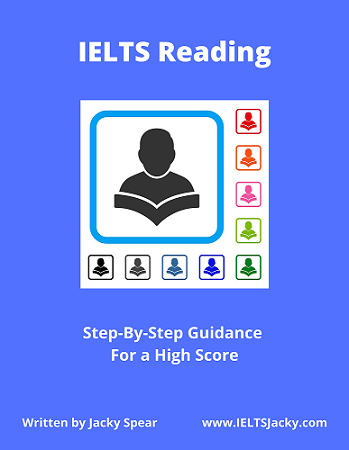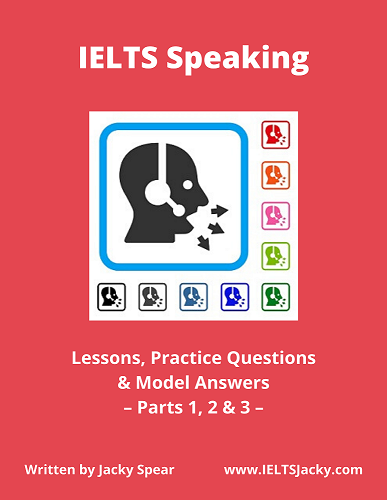IELTS Letter Writing Tips
All my lessons on General Writing Task 1 are crammed full of IELTS letter writing tips but on this page, I want to cover the topic that is the most important of all – assessment and marking criteria.
In order to score highly in Task 1, you must understand what the examiner will be looking for when they assess your letter. In other words, it’s essential that you understand the marking criteria.
Unless you know what the examiner wants, you won’t be able to give it to them.
The IELTS marking criteria can seem complicated at first sight and rather overwhelming. My aim is to simplify them for you. We’re going to focus on Bands 6 - 8 as these are the levels most students are hoping to achieve.
As with all parts of the IELTS exam, General Writing Task 1 is marked according to four criteria.
These are:
- Task Achievement – appropriate response to the task
- Cohesion & Coherence – the ability to present a well-structured essay or letter
- Lexical Resource (Vocabulary) – the ability to use a range of appropriate vocabulary and to use it correctly
- Grammatical Range & Accuracy – the ability to use grammar correctly and to use a range of grammar forms
Each carries 25% of the marks.
We’ll now look at them in turn and I’ll give you IELTS letter writing tips for each of them. First, Task Achievement.
Task Achievement
This is what you need to do to get each band level.
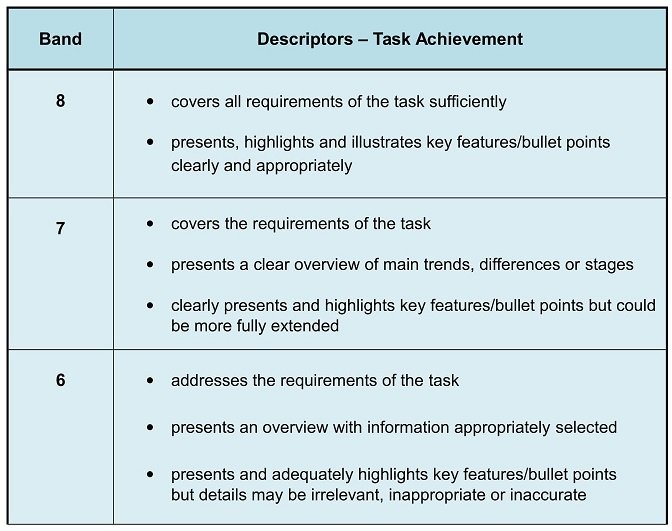
And, these are my top tips related to the detail in this table.
IELTS Letter Writing Tips For Task Achievement
Here’s a sample question to help illustrate some of these tips.
You have borrowed something from your friend and it got damaged.
Write a letter to your friend. In the letter:
- apologise for the damage to the item
- explain what happened
- say how you are going to fix the issue
Tip 1: Write over 150 words.
You must write over 150 words or you won’t score more than a band 5 for task achievement as you won’t have met the marking criteria.
Tip 2: Clearly state the reason for writing your letter.
The first sentence of the question tells you why you are writing the letter. In this question, it’s to tell your friend that the item you borrowed got damaged.
Tip 3: Use the correct tone – formal or informal.
Who are you writing to? If it is a friend or close relative, use an informal tone. For all other recipients, use a formal tone. Never mix formal and informal language.
The letter recipient in our sample question is a friend, so we would need to use an informal tone.
Tip 4: Write about each of the 3 bullet points.
Write a paragraph for each bullet point and fully develop each idea. Don’t write about anything else.
Cohesion & Coherence
Next, we’ll look at Cohesion and Coherence.
Cohesion and Coherence assess your ability to present a well-structured essay. This is what you need to do to get each band level.
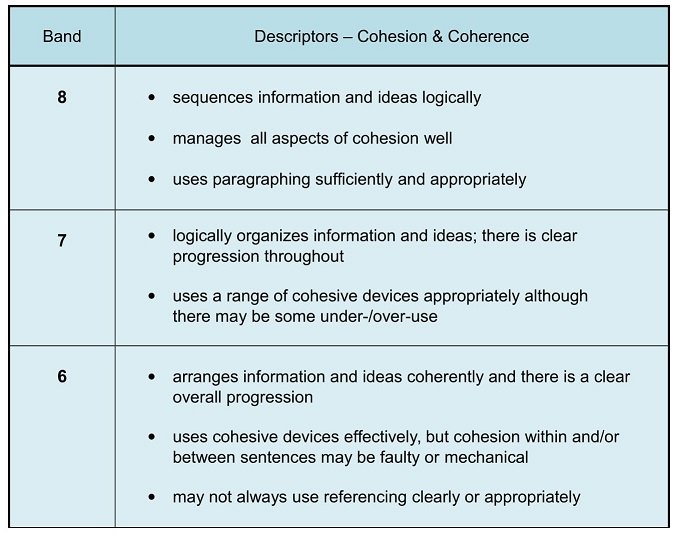
IELTS Letter Writing Tips For Cohesion & Coherence
Tip 1: Have a clear structure to your letter.
Your ideas must progress logically from one to another. You can achieve this by using this easy to remember 6 part structure.
1) Dear .....
2) Paragraph 1: Purpose – why you are writing
3) Paragraph 2: Write about 1st bullet point
4) Paragraph 3: Write about 2nd bullet point
5) Paragraph 4: Write about 3rd bullet point
6) Signoff
Learn how to use it in these lessons: Letter Writing Structure & Letter Planning
Tip 2: Use paragraphs.
Don’t write the main part of your letter in one block of text. Separate it into paragraphs. If you use the outline above, you will have the ideal structure.
Tip 3: Use cohesive devices (linking words) effectively.
For example,
- next
- because
- also
- so
- first
- then
- if
- when
- therefore
- however
- alternatively
- despite
- although
- for example
- on the other hand
However, be careful not to overuse them as this will lose you marks.
Tip 4: Use referencing.
Referencing words, such as ‘he’, ‘she’, ‘it, ‘they’, ‘these’, refer back to something mentioned previously in the text. For example,
Carbon emissions are a growing concern worldwide. They are proven to be a major contributor to global warming.
Vocabulary (Lexical Resource)
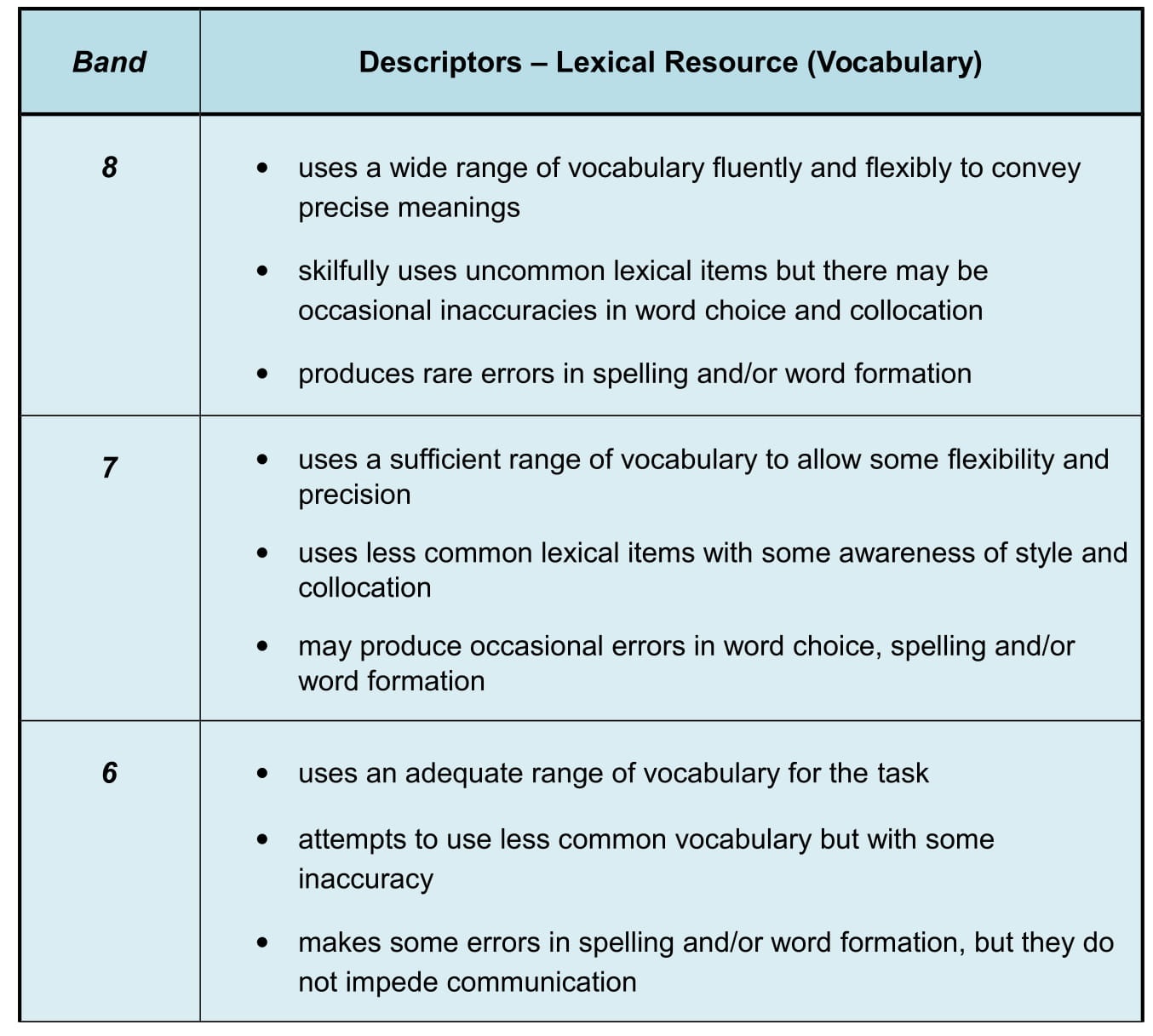
IELTS Letter Writing Tips For Vocabulary
Tip 1: Put accuracy first.
Whilst you must show that you can use a wide range of vocabulary to score highly, you do have to be able to spell it correctly. It’s better to use fewer, simpler words correctly than attempt more complex or less familiar words and misspell them.
You actually need a smaller range of vocabulary than you probably think you do.
Tip 2: Use appropriate vocabulary.
Use the right words to express what you want to say. This might sound obvious but many students try to include elaborate, high-level words just to show that they know them. Very often, such words are totally inappropriate and don’t sound right.
Keep it simple and correct. Your language should sound natural.
Tip 3: Use synonyms correctly.
Synonyms (different words that mean the same thing) are essential for a high mark but make sure that you know any you use 100%.
Similar words do not always have the same meaning. The synonyms you choose must have exactly the same meaning as the words you are replacing.
It’s particularly important to use synonyms to replace key words in the question. Repeating the same words as are used in the question many times over will lose you marks.
Tip 4: Take care with collocations.
A collocation is a combination of two or more words that sound correct to a native speaker when used together. Collocations are an integral part of everyday English and the examiner will be looking out for them.
However, you must take great care to use them correctly. The word combination often doesn’t work if you try to replace the first word with a synonym. For example, we say,
- heavy rain but not weighty rain
- fast food not quick food
- keen interest not eager interest
Only use collocations that you know 100%.
Grammatical Range & Accuracy
You will be assessed on your ability to use a range of grammar tenses and structures correctly.
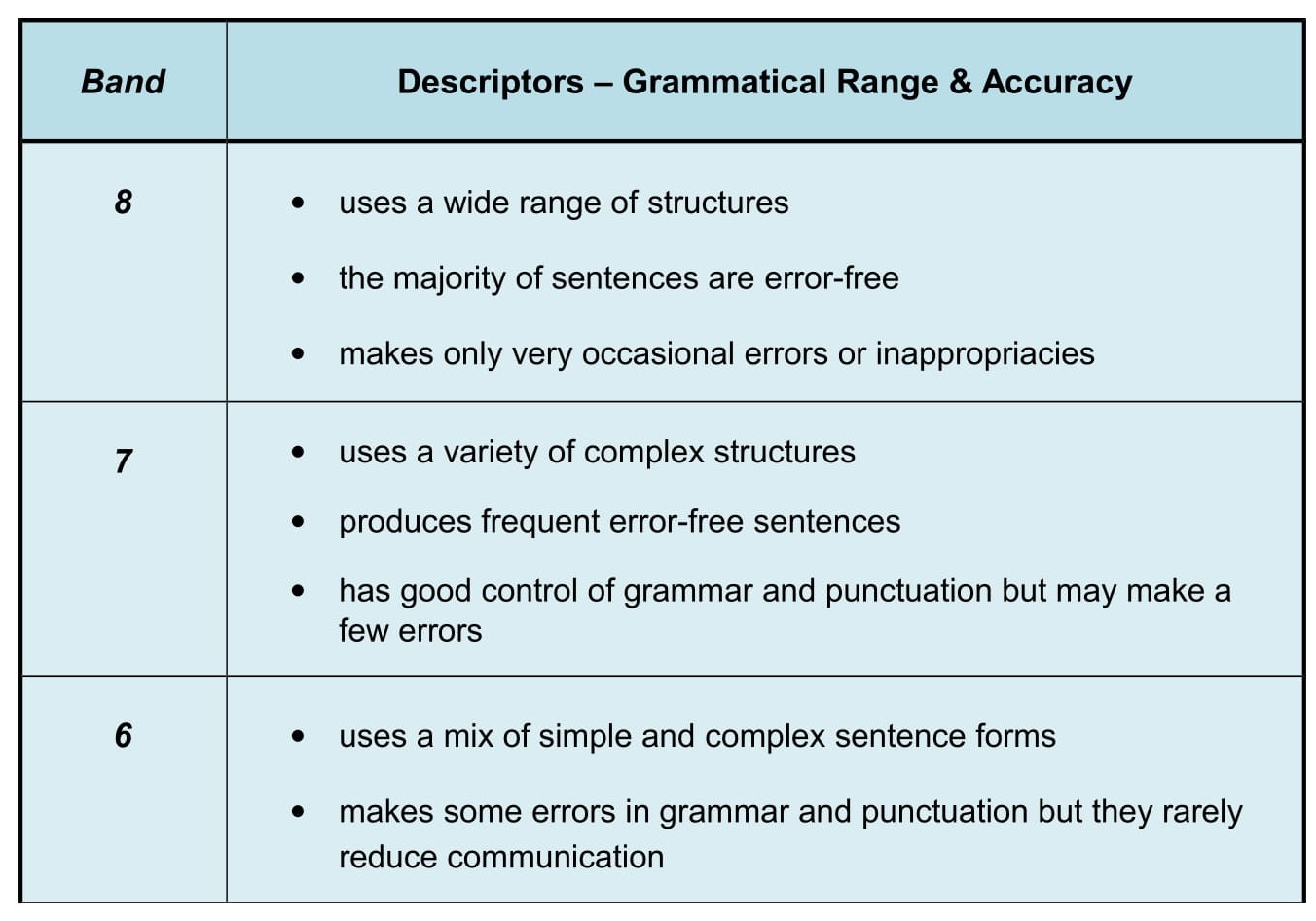
IELTS Letter Writing Tips For Grammar
Tip 1: Put accuracy first.
Never try to use complex grammatical structures or cram in every structure you know just to impress the examiner. Correct, appropriate grammar is what will score you marks. It is better to keep it simple and error-free than lose marks for inaccuracy.
Tips 2: Use clues in the question.
The most essential thing is to use the correct verb tenses in your letter.
Identify the tenses used in the 3 bullet points as these will be the ones you need to use in the 3 corresponding paragraphs of the letter. Let me demonstrate.
Here’s our sample question again:
You have borrowed something from your friend and it got damaged.
Write a letter to your friend. In the letter:
- apologise for the damage to the item
- explain what happened
- say how you are going to fix the issue
- Bullet point 1 uses the present tense so you will use the present tense to make your apology, e.g.
I am really sorry...
- Bullet point 2 is about what happened in the past so you will use the past tense to explain what happened to the item you borrowed, e.g.
I was running for the bus and tripped and dropped your book in a puddle.
- Bullet point 3 is about what you will do in the future to solve the problem. For this, you will use the future tense.
I will, of course, replace it as I know that you haven’t read it yet.
Tip 3: Use the correct structures.
There are 7 different types of letter you could be asked to write in your test:
Each requires slightly different grammar structures so be sure that you know them. They should all be familiar to you if you’ve been studying English for a while so it will just be a matter of selecting the right ones.
You’ll find lots of help with this in the lessons on each question type. Click the links to go to the individual lessons.
There
are also many more IELTS letter writing tips in the lessons in the menu below.
|
Want to watch and listen to this lesson on IELTS letter writing tips? Click on this video. |
Find More IELTS Letter Writing Tips
IELTS General Writing – A summary of the test including important facts, test format & assessment.
Letter
Format – The format, the 7 topics, letter
structure, formal & informal, assessment & marking criteria, sample
questions. Essential information you need to know.
Letter Writing Tips – Learn top tips on how to meet the assessment and marking criteria and achieve a high score.
Letter Writing Structure – Find out how to use this easy to learn letter structure to write a high-scoring letter. Includes a model answer.
How To Plan a Letter – Learn a simple 5 step process & 6 part letter structure. Also, help to understand the question & generate ideas.
Formal or Informal – How to decide what type of
letter to write. Sample questions & 2 model letters.
Letter Writing Vocabulary – Learn useful phrases to help you achieve a high score. Also, know how to start & end your letter.
How To Write an Informal Letter – Step-by-step instructions, simple 4 step plan & 6 part letter structure, model letter.
How To Write a Formal Letter – Step-by-step instructions, simple 4 step plan & 6 part letter structure, model letter.
Letter Topics – Learn the 7 most common letter topics & other popular subjects. Includes 20 sample questions.




